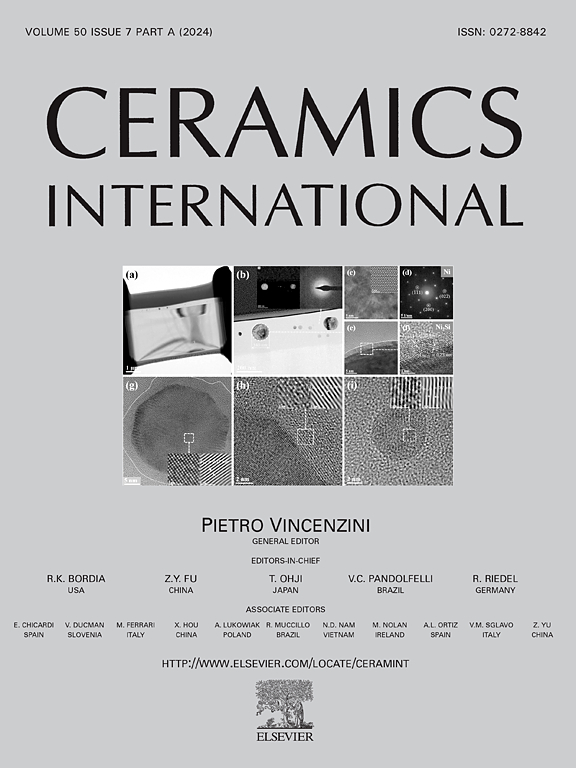Effects of sintering temperature on microstructure and varistor performances of ZnO-SrCO3-Co2O3 ceramics
IF 5.1
2区 材料科学
Q1 MATERIALS SCIENCE, CERAMICS
引用次数: 0
Abstract
Sintering temperature is decisive for optimizing the grain boundary environment to obtain the high performance ZnO based varistor ceramic. In this work, the impacts of sintering temperature on microstructure and electrical properties of ternary Zn-Sr-Co varistor were investigated. It was found that the distribution of Sr, the critical factor to form grain boundary, was heavily sensitive to sintering temperature. The considerable Sr ions precipitated at grain boundaries and formed the clusters of SrZnO2 while the sintering temperature increases from 1150 °C to 1190 °C. Besides, the precipitation of Sr led to the large segregation of Co at grain boundaries. The enrichment behavior of Sr and Co contributed to the optimization of grain boundaries, resulting in the enhanced barrier height. As a result, the excellent nonlinear current-voltage performances, i.e., the high nonlinear coefficient of 56.47 and the low leakage current density of 0.73 μA/cm2 were obtained in the ternary ZnO-SrCO3-Co2O3 varistor sintered at 1190 °C. However, the grain boundary environment would be destroyed by the excessive temperature of 1210 °C, resulting in the degradation of grain boundary barrier and especially a surge in the leakage current IL from 0.73 to 92.19 μA/cm2. In addition, varying sintering temperature has the important effects on impedance and dielectric properties of the ZnO-SrCO3-Co2O3 varistors. The findings provide new perspectives for developing the high-performance ternary ZnO-SrCO3-Co2O3 varistor ceramics by optimizing the initial grain boundary environment at different sintering temperatures.
烧结温度对 ZnO-SrCO3-Co2O3 陶瓷微观结构和变阻器性能的影响
烧结温度对优化晶界环境以获得高性能氧化锌压敏电阻陶瓷起着决定性作用。在这项工作中,研究了烧结温度对三元 Zn-Sr-Co 变阻器微观结构和电气性能的影响。研究发现,形成晶界的关键因素 Sr 的分布对烧结温度非常敏感。当烧结温度从 1150 ℃ 升高到 1190 ℃ 时,大量硒离子在晶界析出并形成 SrZnO2 簇。此外,Sr 的析出导致了 Co 在晶界的大量偏析。Sr 和 Co 的富集行为促进了晶界的优化,从而提高了势垒高度。因此,在 1190 ℃ 下烧结的三元 ZnO-SrCO3-Co2O3 变阻器获得了优异的非线性电流-电压性能,即 56.47 的高非线性系数和 0.73 μA/cm2 的低漏电流密度。然而,1210 ℃ 的过高温度会破坏晶界环境,导致晶界屏障退化,尤其是漏电流 IL 从 0.73 μA/cm2 猛增至 92.19 μA/cm2。此外,不同的烧结温度对 ZnO-SrCO3-Co2O3 变阻器的阻抗和介电性质也有重要影响。这些发现为通过优化不同烧结温度下的初始晶界环境来开发高性能三元 ZnO-SrCO3-Co2O3 变阻器陶瓷提供了新的视角。
本文章由计算机程序翻译,如有差异,请以英文原文为准。
求助全文
约1分钟内获得全文
求助全文
来源期刊

Ceramics International
工程技术-材料科学:硅酸盐
CiteScore
9.40
自引率
15.40%
发文量
4558
审稿时长
25 days
期刊介绍:
Ceramics International covers the science of advanced ceramic materials. The journal encourages contributions that demonstrate how an understanding of the basic chemical and physical phenomena may direct materials design and stimulate ideas for new or improved processing techniques, in order to obtain materials with desired structural features and properties.
Ceramics International covers oxide and non-oxide ceramics, functional glasses, glass ceramics, amorphous inorganic non-metallic materials (and their combinations with metal and organic materials), in the form of particulates, dense or porous bodies, thin/thick films and laminated, graded and composite structures. Process related topics such as ceramic-ceramic joints or joining ceramics with dissimilar materials, as well as surface finishing and conditioning are also covered. Besides traditional processing techniques, manufacturing routes of interest include innovative procedures benefiting from externally applied stresses, electromagnetic fields and energetic beams, as well as top-down and self-assembly nanotechnology approaches. In addition, the journal welcomes submissions on bio-inspired and bio-enabled materials designs, experimentally validated multi scale modelling and simulation for materials design, and the use of the most advanced chemical and physical characterization techniques of structure, properties and behaviour.
Technologically relevant low-dimensional systems are a particular focus of Ceramics International. These include 0, 1 and 2-D nanomaterials (also covering CNTs, graphene and related materials, and diamond-like carbons), their nanocomposites, as well as nano-hybrids and hierarchical multifunctional nanostructures that might integrate molecular, biological and electronic components.
 求助内容:
求助内容: 应助结果提醒方式:
应助结果提醒方式:


